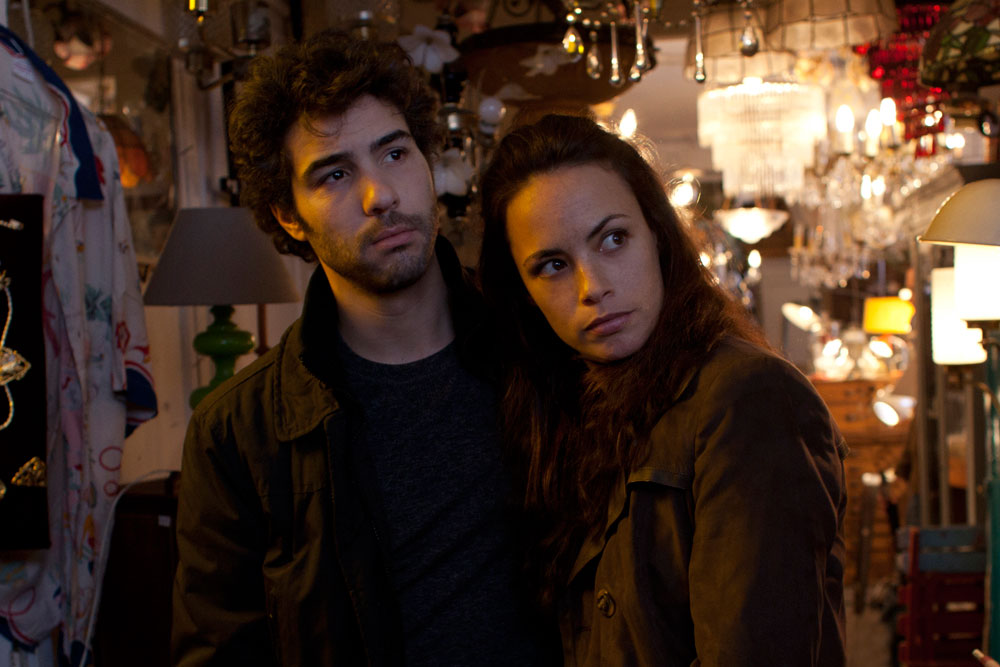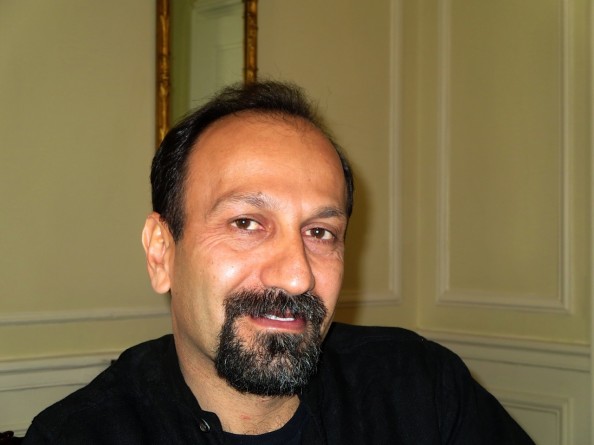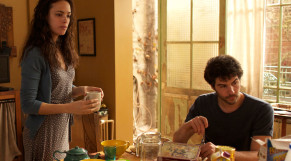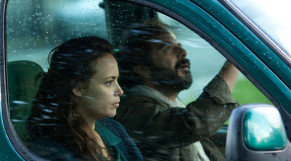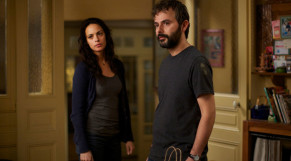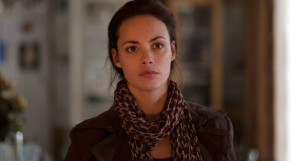Iranian writer-director Asghar Farhadi journalists at the New York junket for his new film, “The Past,” that he was sleeping when his publicist called him to tell him that his new film just received a Golden Globe nomination for best foreign film. The director had just flown in from Los Angeles the night and was very tired. Although he said he was very happy about the nomination, he was also guarded and modest. Star Berenice Bejo has already been honored with a best actress nod at Cannes in May and the National Board of Review named “The Past” best foreign film. (In a surprise upset, when the shortlisted nine best foreign films were announced the other day, “The Past” did not make the cut.)
On the surface “The Past,” has a similar theme as “A Separation,” Mr. Faradi’s last film, which received the Golden Globe and Oscar for Best Foreign Film in 2011. It is about broken marriages and messy relationships and collateral damage to children as a result of the mistakes and bad choices made by adults. This time the action moves from Teheran to a colorless Paris suburb – the antithesis of the City of Lights – and the relationships of the three people in the story revolves around layers of deceit, fear, love and loss.
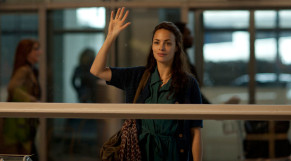 “The Past” begins in a French airport where Marie (Bejo) waits for her estranged husband, Ahmad (Ali Mosaffa). He’s arriving from Teheran to finalize their divorce after a long separation, so she can marry Samir (Tahar Rahim from “A Prophet”). It’s all very civilized and polite but they have unresolved issues, and there’s an undercurrent of tension. At the airport they first try to talk through glass but cannot hear each other to communicate. Then Marie drives and backs out in reverse, where they are nearly hit by a car from behind. Ahmad yells at Marie, a stressed-out mother who has questionable taste in men, “What are you doing?” It becomes a question you could ask of all the characters as the movie, part mystery and part love story, unfolds.
“The Past” begins in a French airport where Marie (Bejo) waits for her estranged husband, Ahmad (Ali Mosaffa). He’s arriving from Teheran to finalize their divorce after a long separation, so she can marry Samir (Tahar Rahim from “A Prophet”). It’s all very civilized and polite but they have unresolved issues, and there’s an undercurrent of tension. At the airport they first try to talk through glass but cannot hear each other to communicate. Then Marie drives and backs out in reverse, where they are nearly hit by a car from behind. Ahmad yells at Marie, a stressed-out mother who has questionable taste in men, “What are you doing?” It becomes a question you could ask of all the characters as the movie, part mystery and part love story, unfolds.
Mr. Farhadi speaks limited English so his translator, Sheida Dayana, assisted him. Here are highlights from the junket:
Q: How do the awards nominations and especially your Oscar in 2011 affect your career and movie choices?
AF: The biggest influence that it has is that it adds to the number of the audience throughout the world. This gives me more energy and it also adds to my sensibilities and my preciseness for my other works.
The traumatic subject of divorce moves to Europe from Teheran this time. Did you feel that to touch on the same subject you had to move to another country?
No, not really. I did feel that I want to work on this subject matter again but I didn’t think that I have to situate it in another country necessarily.
When this story occurred to me I really resisted making it outside Iran because it seemed to me that it will be very difficult to make, but every time I thought about it, even at night when I closed my eyes, I kept seeing the images of this film, and I said to myself that I have no choice and I have to enter the path and I have to make this film.
And this film is following my other films, where are about human relationships. Divorce and family crisis are an excuse for me, so that I can get into human relationships more.
Why do you think it is so hard to shoot a film with a subject like this in Iran? Is it because of the issue of divorce?
I think you have something wrong here. I didn’t make this film outside Iran because of the limitations or the problems. All these years I prefer to make my films in face of all the censorship and all the limitations because this fighting and resistance against censorship is important to me. I don’t like to run away from censorship and go somewhere else. I’d like to face it and find a way to deal with it.
If I came outside Iran and made a film it was because the story happened outside Iran and I couldn’t have made it in Iran. But my preference is to make films in Iran.
What inspired the story? Was it a personal experience or someone told you this story?
This was a memory that a friend of mine said to me 10 years ago. I wanted to meet this friend but the friend told me that he’s on his way to a trip to another country in order to finalize his divorce with his ex-wife. And this was an ex-wife that he had lived with a few years ago for a number of years, and he had separated from for a few years. And it seemed to me that it would be a strange situation for two people who had lived together for a few years and had separated now for a few years to be placed under one roof again. This story had occurred to me before the story of “The Separation,” but I kept thinking that because it’s outside Iran I’m not going to make it. But then after “A Separation” I couldn’t resist anymore and I made the film outside Iran.
Talk about the political restraints you face? Also, although this film isn’t overtly political aren’t you trying to make a political statement in the economic and social hardships faced by the main characters?
I think all the films that are social also have a political side. It depends on the audience’s viewpoint. In this film I mostly considered moral dilemmas, but of course economic situations have an impact on creating these moral dilemmas.
How did censorship in Iran affect the subject of this film?
Censorship happens in Iran. It’s present in Iran. But I didn’t do this in Iran. I made it in France and it had nothing to do with the Iranian government.
In the beginning of the film, when Marie is driving and Ahmad is in the car, it is raining hard, and neither of them sees what is behind them, and Marie almost hits the car that is coming. The next cut is a jump cut, and I wonder if your intention was to comment on how they are not getting a clear view of the past and how it will affect the future?
Yes, what you are saying is correct. They get into the car and they put it in reverse and they look behind them and then there is an accident. It’s foreseeing or foretelling what is ahead in the film, and that looking to the past and returning to the past could be dangerous. And then after that we’re looking at the back of the car that’s coming out of the tunnel.
This kind shot is reminiscent of many of the great directors who use this technique to intimate what is ahead in the story. Were there any directors who influenced or inspired you?
This is something I try to do in all of my other films. In the beginning you give an address to the audience about how to view the film, and little by little with these little signifiers you can highlight the main theme.
The characters are so appealing in many ways even as they are flawed in other ways. But at the beginning Ahmad is particularly likeable and viewers may hope he and Marie reconcile. Did you ever consider having them get back together again? You are now getting to be known as the break-up director?
(Mr. Farhadi laughed and needed no translator for the question.) It’s interesting that a lot of people think that in my personal life I’ve had an experience of divorce. One time my daughter told me, don’t make movies like that anymore because my friends keep thinking you guys are separated.
Your daughter, Sarina, was so excellent as the daughter who is most harmed by her parent’s divorce in “A Separation.” Do you have plans to work with her again?
If I find a story that suits her I’d really like to work with her again. But she likes to act in theater, not in cinema.
She’ll probably also want a pay raise.
Mr. Farhadi laughed.
The interesting thing in this relationship, this triangle, is that the audience sympathizes with all the participants at different moments. But as a director you seem to try to keep yourself impartial. You don’t’ take sides. Can you say a little bit more this?
It’s a very important point, and I always try to keep it in my films. I don’t like to separate my characters into and bad. This division is an abstract division. It’s not real. If you give the characters a chance to defend themselves and explain the reasons why they do certain things than you cannot divide them into good and bad characters.
The films I make are also a statement against the treatment that divides people into good and bad. It seems to me that in reality everyone has reasons for what they do, and we should give them a chance to defend themselves. As a filmmaker I keep the same distance with all the characters. I don’t highlight someone, and I don’t undermine someone else. Even in the vision of my camera, in the decoupage, I try to keep the same distance with each character.
Can you talk about casting, especially your star, Berenice Bejo, who was so different in the role she portrayed in “The Artist”?
When I came here two years ago to promote “A Separation,” she was also here promoting “The Artist.” We kept running into each other in the hotels or at different ceremonies. At that time I was writing the script for “The Past.” But when I did some research someone told me she’s not going to be available for that time and she’s busy doing some other projects, and I forgot about her. I went to other actresses, but then I was lucky to find out that she’s free and that she can come. I contacted her in South America and she quickly came.
What was it about her as an actress or a person that made you know she was perfect for that part?
An actor who can play in comedy can play in any role. I note the actors of comedy very significantly. I have a lot of respect and regard for them. When I saw “The Artist” I realized that Bérénice is a very intelligent actress and that she does research on her work. The type of acting that she had in that film was reminiscent of classic American films and this meant that she had done research on it, and I really like actors who do research.
The young actress who plays Marie’s daughter, Pauline Burlet, plays a sensitive girl who could also be dangerous. Talk about casting her.
We put in an announcement for casting for this role. When they brought the images Pauline’s test caught my eye because she had a dual face. She was both calm but I also saw some sense of un-calmness in her. It seemed to me behind her eyes she had a lot of untold stories.
Would you consider making films in Hollywood?
Hollywood, I really don’t think so. But working in the U.S., I might come for that, but even if I worked in the U.S. I would still continue the same way as I’ve (always) worked.
What are you doing next?
I’m thinking about two stories, one takes place in Iran and one is outside Iran and by the end of the year I will know.
To the question of whether they will be about couples who break up, Mr. Farhadi would only laugh.

